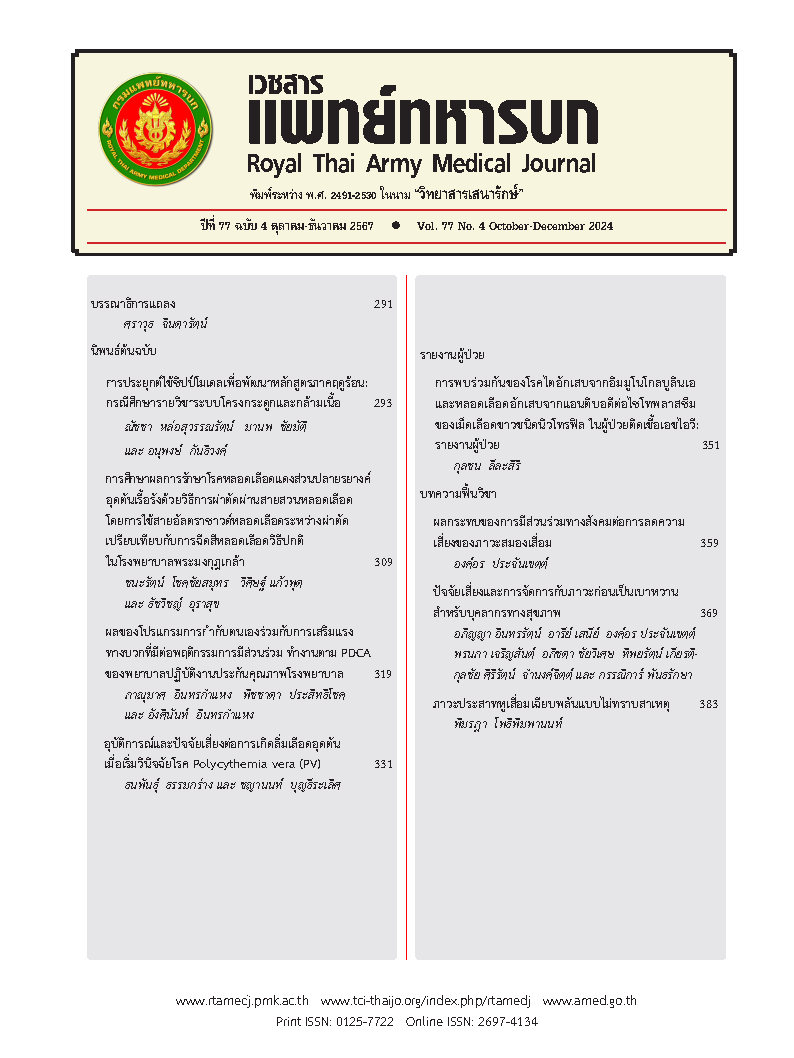ผลของโปรแกรมการกำกับตนเองร่วมกับการเสริมแรงทางบวกที่มี ต่อพฤติกรรมการมีส่วนร่วม ทำงานตาม PDCA ของพยาบาล ปฏิบัติงานประกันคุณภาพโรงพยาบาล
Main Article Content
บทคัดย่อ
การศึกษาครั้งนี้ มีวัตถุประสงค์เพื่อศึกษาผลของโปรแกรมการกำกับตนเองร่วมกับการเสริมแรงทางบวกที่มีต่อพฤติกรรมการมีส่วนร่วมทำงานตาม PDCA ของพยาบาลปฏิบัติงานประกันคุณภาพโรงพยาบาลโดยกลุ่มตัวอย่างคือพยาบาลวิชาชีพที่ปฏิบัติงานในโรงพยาบาลทหารโดยได้จากการสุ่มตัวอย่างแบบแบ่งชั้นภูมิ และใช้การสุ่มจัดประเภท กลุ่มทดลอง 32 คนและกลุ่มควบคุม 32 คน โปรแกรมการกำกับตนเองร่วมกับการเสริมแรงทางบวก ประกอบด้วยกิจกรรม 3 ขั้นตอนหลัก 5 กิจกรรม ใช้เวลา 8 สัปดาห์ การวิเคราะห์ข้อมูลมูลใช้สติเชิงพรรณนา สถิติ Independence t-Test และPaired t-Test ผลการวิจัยพบว่ากลุ่มทดลองเมื่อได้รับโปรแกรมฯ มีคะแนนการมีส่วนร่วมทำงานตาม PDCA แตกต่างกับกลุ่มควบคุมอย่างมีนัยสำคัญทางสถิติที่ระดับ 0.05 ( t=5.73,D<0.05 ) โดยกลุ่มทดลองมีค่าเฉลี่ยคะแนน (M=5.03,SD=0.78) สูงกว่ากลุ่มควบคุม (M=4.4.77,5D-0.23 ) และพบว่ากลุ่มทดลองหลังได้รับโปรแกรมฯ มีค่าเฉลี่ยคะแนนการมีส่วนร่วมทำงานตาม PDCA แตกต่างกับก่อนได้รับโปรแกรมฯ อย่างมีนัยสำคัญทางสถิติที่ระดับ 0.05( t-6.39,p<0.05) โดยหลังได้รับโปรแกรมฯมีค่าเฉลี่ยคะแนนการมีส่วนร่วมทำงานตาม PDCA ( M-5.03,SD-0.07 ) สูงกว่าก่อนได้รับโปรแกรมฯ ( M=4.78,SD=0.26 ) ดังนั้นโปรแกรมฯ นี้จึงเหมาะสำหรับผู้บริหารโรงพยาบาลในการนำไปใช้เพื่อพัฒนาพฤติกรรมการทำงานของบุคลากรในหน่วยงาน
Downloads
Article Details

อนุญาตภายใต้เงื่อนไข Creative Commons Attribution-NonCommercial-NoDerivatives 4.0 International License.
บทความในวารสารนี้อยู่ภายใต้ลิขสิทธิ์ของ กรมแพทย์ทหารบก และเผยแพร่ภายใต้สัญญาอนุญาต Creative Commons Attribution-NonCommercial-NoDerivatives 4.0 International (CC BY-NC-ND 4.0)
ท่านสามารถอ่านและใช้งานเพื่อวัตถุประสงค์ทางการศึกษา และทางวิชาการ เช่น การสอน การวิจัย หรือการอ้างอิง โดยต้องให้เครดิตอย่างเหมาะสมแก่ผู้เขียนและวารสาร
ห้ามใช้หรือแก้ไขบทความโดยไม่ได้รับอนุญาต
ข้อความที่ปรากฏในบทความเป็นความคิดเห็นของผู้เขียนเท่านั้น
ผู้เขียนเป็นผู้รับผิดชอบต่อเนื้อหาและความถูกต้องของบทความของตนอย่างเต็มที่
การนำบทความไปเผยแพร่ซ้ำในรูปแบบสาธารณะอื่นใด ต้องได้รับอนุญาตจากวารสาร
เอกสารอ้างอิง
Kamloifa N, Pheeraphon R. [Continuous Quality Accreditation According to HA Standards in Community Hospitals]. Acad J Community Public Health.2021;7(4):181-86. Thai.
Ministry of Public Health. [Manual for the Development of “Star-Rated” Health-Promoting Hospitals]. Nonthaburi: Ministry of Public Health; 2018. Thai.
Healthcare Accreditation Institute (Public Organization). [Annual Report 2020]. Nonthaburi: Healthcare Accreditation Institute (Public Organization); 2020.Thai.
Taufik D. PDCA cycle method implementation in industries: systematic. IJIEM (Indones J Ind Eng Manag). 2020;1:157-66.
Silakul S, Volrathongchai K. [Selected Factors Affecting the Participation of Generation Y Professional Nurses in Hospital Quality Development in Health Region 9]. J Res Nurs Midwifery Health Sci. 2022;42(2):73-84. Thai.
Herzberg F, Mausner B, Snyderman BB. The motivation to work. New Jersey, United States:Transaction publishers; 2011.
Sakkato W, Charoenwiriyakul C. [Motivational and Supportive Factors Influencing DecisionMaking Processes to Join Collaborative Networks for Healthcare Quality Improvement]. Journal of Health Research and Development. 2020;6(2):127-39. Thai.
Chumsri A, Udompanit S, Buaphan P. [Motivational and Success Factors Affecting the Performance of Dental Personnel in District Health Promotion Hospitals, Buriram Province]. Dent J. 2023;34(2):1-7. Thai.
Wisetsuwanphoom P. Enhancing student Motivation in digital era. Bangkok: Chulalongkorn University Press; 2022.
Bandura A. Human agency in social cognitive theory. Am Psychol. 1989;44(9):1175-84
Fischer C, Kalucza J. Behavioural approaches to public management and governance [Internet]. Public Management and Governance;2023. P. 66-76 [Cited 2024 Jan 10]. Available from : https://osf.io/preprints/osf/dukz3
Cohen J. Statistical Power Analysis for the Behavioral Sciences. 2nd ed. Hillsdale, NJ: Lawrence Erlbaum Associates;1998.
Cronbach LJ. Coefficient alpha and the internal structure of tests. Psychometrika. 1951;16(3):297-334.
Kline P. Handbook of Psychological Testing. 2nded. London: Routledge;2000.
Kooij D, Van den Broeck A. Historical and contemporary perspectives on work motivation in human resource management. In: Oxford Research Encyclopedia of Business and Management. Oxford University Press; 2022.
Nicholls JG. The competitive ethos and democratic education. Cambridge (MA): Harvard University Press; 1989.
Higgins ET. Promotion and prevention: Regulatory focus as a motivational principle. Adv Exp Soc Psychol. 1998;i30.P.1-9.
Orobosa A, Joel AC. Abraham Maslow’s hierarchy of needs and Frederick Herzberg’s twofactor motivation theories: Implications for organizational performance. Romanian Econ J. 2023. XXVI(85):31-48.
Chansane S. [Development of problem-based learning activities combined with online lessons to enhance learning achievement, problem-solving skills, and lifelong learning in safe use of information technology among Grade 7 students]. J Soc Sci Local Dev Mahasarakham Rajabhat Univ. 2024;8(1):371-80.Thai.
Kazdin AE, Kazdin AE. Review of Token Economies I. In: Kazdin AE, editor. The Token Economy: A Review and Evaluation. Springer;1977. P.113-140.


